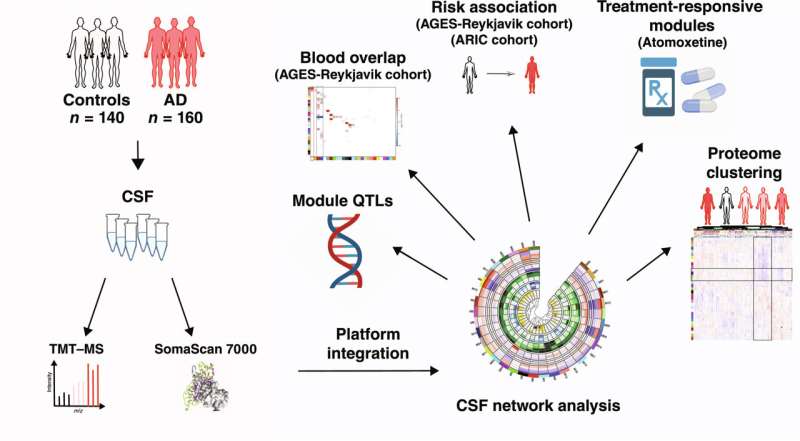June 28, 2024 report
This article has been reviewed according to Science X's editorial process and policies. Editors have highlighted the following attributes while ensuring the content's credibility:
fact-checked
peer-reviewed publication
trusted source
proofread
Protein maps created using scanning technology on cerebrospinal fluid to find markers for Alzheimer's

A large team of neuroscientists, biochemists and Alzheimer's specialists affiliated with institutions in the U.S. and Iceland has created a protein map to look for patterns in cerebrospinal fluid that may serve as markers for the onset of Alzheimer's disease decades before diagnosis.
In their study, published in the journal Science Translational Medicine, the group used high-resolution scanning technology to help uncover the underlying causes of the disease.
Alzheimer's disease is associated with a buildup of amyloid-beta and tau proteins in the brain. Prior research has shown that scanning and analyzing blood and other biofluids can help detect and confirm an Alzheimer's diagnosis, but doctors are only able to do so once the disease has progressed.
Doctors (and their patients) would like a biomarker that suggests the likelihood of developing Alzheimer's when there is still a chance of slowing or stopping it. And that means finding a test that could predict the disease many years before symptoms start.
In this new study, the research team has focused their attention on cerebrospinal fluid, suspecting it might hold hints of Alzheimer's long before symptoms arise.
The researchers obtained thousands of cerebrospinal fluid samples from 160 people at various stages of Alzheimer's disease development. They then scanned all the samples using tandem mass tag mass spectrometry and analyzed them using SomaLogic's modified aptamer-based SomaScan 7000 assay, creating profiles for each of the samples and then comparing them with one another.
That allowed the research team to build maps to search for patterns in multiple types of proteins at the same time—together, they could provide an early marker for Alzheimer's disease. The team developed 34 modules for use in testing.
In testing the modules, the researchers found what they describe as a correlation between Alzheimer's and the genetic risk factor APOE ε4—a finding that hinted at the discovery of a marker for the disease that could be used 20 years before current diagnosis methods.
More information: Eric B. Dammer et al, Proteomic analysis of Alzheimer's disease cerebrospinal fluid reveals alterations associated with APOE ε4 and atomoxetine treatment, Science Translational Medicine (2024). DOI: 10.1126/scitranslmed.adn3504
© 2024 Science X Network



















